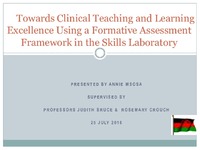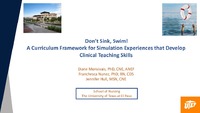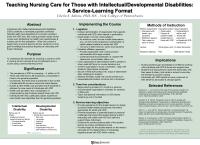| dc.contributor.author | Msosa, Annie N. | en |
| dc.date.accessioned | 2016-07-13T11:10:18Z | |
| dc.date.available | 2016-07-13T11:10:18Z | |
| dc.date.issued | 2016-07-13 | |
| dc.identifier | INRC16P07 | |
| dc.identifier.uri | http://hdl.handle.net/10755/616339 | |
| dc.description | <p>Theme: Leading Global Research: Advancing Practice, Advocacy, and Policy</p> | en |
| dc.description.abstract | <p>Session presented on Monday, July 25, 2016;</p>
<p><strong>Background:</strong> Nursing education institutions in Malawi adopted the use of the skills laboratory through benchmarking from the developed countries. In view of this, the skills laboratories have been operational at the Kamuzu College of Nursing for a number of years. However, upon the evaluation of teaching and learning in the skills laboratories, the findings show that demonstrations and return demonstrations are the practical necessities of clinical teaching that enrich clinical teaching experiences. The OSCE method of evaluation is in use and both students and nurse educators expressed that it is a good method of assessment. However, the OSCE is experienced with some challenges. The lack of formative assessment in the skills laboratory was considered one of the major set backs by the students and nurse educators. As such, a formative assessment framework was developed, validated and tested through a quasi experiment in the college-based skills laboratories.</p>
<p><strong>Purpose:</strong> The purpose of the study was to determine how a Formative Assessment Framework (FAF) impacts the quality of clinical teaching and. The specific objective was to evaluate the impact of FAF by determining and comparing students' competence in selected general nursing and midwifery skills between experimental and control groups of students.</p>
<p><strong>Design and Methods: </strong>Data were collected using a quasi-experiment conducted among junior (n=104) and senior undergraduate nursing students (n=62) using the formative assessment framework. Students' from both groups were randomly assigned to the control and experimental group. The minimum requirements for the Formative Assessment Framework included a clinical demonstration, regular supervised practice, a targeted return demonstration by the nurse educator and feedback in the skills laboratories for 6-7 weeks. Pre-testing and post-testing were conducted among the students during the first and final weeks of the intervention. Junior students were tested on two nursing procedures while senior students were testes on four midwifery procedures. However, only the results from the two nursing procedures (intravenous insulin administration, colostomy care) and two midwifery procedures (breast assessment and third stage management of labour) have been reported in this paper. Data were analysed quantitatively using the STATA software statistical packages version 13.</p>
<p><strong>Results: </strong>The intervention groups performed better than the control groups. Students demonstrated mean improvement during insulin procedure (P, 0.0021), Breast assessment (P, 0.0004) and Third stage management of labour (P, 0.0001). There was no significant difference in colostomy care.</p>
<p><strong>Conclusion:</strong> The use of a formative assessment framework has a significant effect on clinical teaching and learning of students. It has the capacity to prepare the students for the summative OSCE in the skills laboratories.</p> | en |
| dc.format | Text-based Document | en |
| dc.language.iso | en | en |
| dc.subject | Formative Assessment Framework | en |
| dc.subject | Skills Laboratory | en |
| dc.subject | Clinical Teaching and Learning. | en |
| dc.title | Towards clinical teaching and learning excellence using a formative assessment framework in the skills laboratory | en |
| dc.title.alternative | Trends for faculty in nursing education | en |
| dc.type | Presentation | en |
| dc.rights.holder | <p>
All rights reserved by the author(s) and/or publisher(s) listed in this item record unless relinquished in whole or part by a rights notation or a Creative Commons License present in this item record.
</p><p>
All permission requests should be directed accordingly and not to the Sigma Repository.
</p><p>
All submitting authors or publishers have affirmed that when using material in their work where they do not own copyright, they have obtained permission of the copyright holder prior to submission and the rights holder has been acknowledged as necessary.
</p> | |
| dc.description.note | <p>Items submitted to a conference/event were evaluated/peer-reviewed at the time of abstract submission to the event. No other peer-review was provided prior to submission to the Henderson Repository.</p> | |
| dc.type.category | Full-text | en |
| dc.evidence.level | N/A | en |
| dc.research.approach | N/A | en |
| dc.contributor.department | Chi Xi at-Large | en |
| dc.author.details | Annie N. Msosa, RNM | en |
| dc.conference.name | 27th international Nursing Research Congress | en |
| dc.conference.host | Sigma Theta Tau International | en |
| dc.conference.location | Cape Town, South Africa | en |
| dc.date.conferenceyear | 2016 | |
| dc.description.reviewtype | Abstract Review Only: Reviewed by Event Host | en |
| dc.description.acquisition | Proxy-submission | en |





